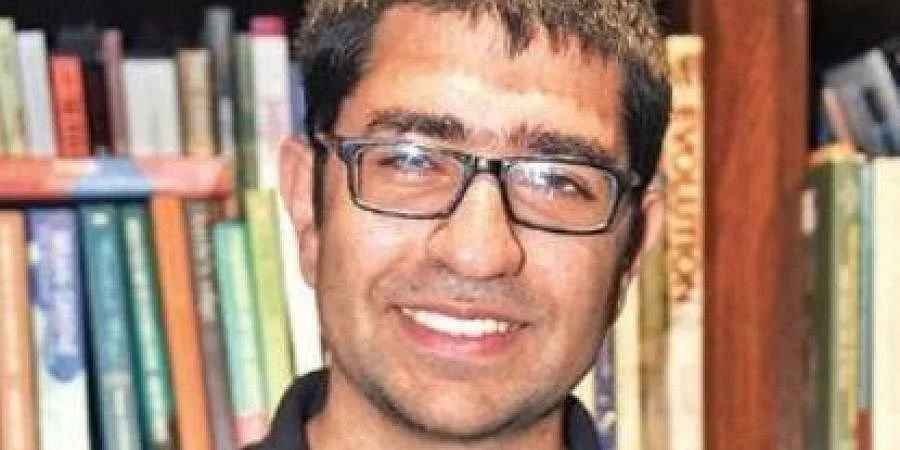Interviewing Gautam Bhatia
Hellooo!!!
This week I read the excellent The Horizon by Gautam Bhatia a return to the mysterious locked city of Sumer (first featured in the earlier The Wall)whose inhabitants have been trapped by cliff sized walls that no one is allowed to cross. It is the kind of chewy intelligent fantasy I love to get stuck into and I highly recommend the two books. Gautam very kindly agreed to answer a few questions on the latest book and future projects.
How would you booktempt The Horizon?
The Horizon is about revolution, about discovering a new language for a new world, and about how every wall must come down at last.
Fantasy usually has quite a simplistic approach to revolution was this something you were keen to challenge?
I’d frame it slightly differently: I think that fantasy hasn’t actually given enough sustained focus to political revolution, possibly because there’s not a lot of fantasy that’s set in what Eric Hobsbwam called “the age of Revolution”. I’m thinking here of the French Revolution(s), the multiple Revolutions of 1848, the October Revolution, the German Revolution of 1918, the Mexican Revolution (that was also a Civil War), and so on. A lot of fantasy is set in pre-industrial worlds, where the political-economic imperatives are, of course, very different; and on the other hand, steampunk fantasy usually has other concerns. One outstanding exception that I can think of off the top of my head is Terry Pratchett’s Night Watch, which my editor forced me to read while I was writing The Horizon.
So I’d say that for me, the motivation was less about challenging a simplistic approach to revolution, and more writing a fantasy/speculative fiction novel with a full-scale urban revolution, barricades and all, and one that involved the concerns that motivated the historical revolutions in our world: inequality, discrimination, the land question, a recalcitrant clergy, an ossified ruling class, opportunist rebels, and so on.
The various factions we encounter all have their own reasons to reject a change how difficult was it creating each one’s motivation?
It was a challenge, but a very enjoyable one. I think that one of my personal, hidden rules for writing fantasy is: first figure out the political economy of the world. Once you’ve figured that out, the position that various individuals, groups, and factions occupy within the class structure becomes legible, and their motivations follow from there. For example, if the political economy is based around land ownership and access to land, there will be a class conflict between landowners and those who work it. And so on. In The Horizon – and, to a lesser extent, The Wall – the challenge was to work out the political economy of a self-sustaining City that is entirely enclosed by a wall, the methods of production, distribution, and reproduction – and that gave rise to the Fifteen Circles, and their assigned tasks. After that, the motivations of different factions resolved themselves.
In your afterward you discuss various historical events that inspired your writing; were there any you couldn’t find a place for in the book but that you loved finding out about?
Oh yes, so much. For example, The Insurgent Barricade – a book that discusses the entire history of the barricade in European revolutions from the 1500s to the 1870s – had so much brilliant discussion of the history of urban conflict and warfare – but all that I could put into The Horizon was a realistic description of a barricade itself!
There’s a lot of Indian history as well, which makes it in in only a truncated form: for example, the great land reform movements immediately after India’s independence – such as the militant Tebhaga movement in West Bengal – inform the events of the novel, but the actual movement itself lasted many years, fundamentally altered social relations (and many, such as gender relations) for the better, and its legacy is still with India today.
What else can we look forward from you in the future?
On the first of January, I have a short story about a robot strike that’s coming out in The Mint, one of India’s national newspapers. It’s only my second published F-SF short story, so I’m quite excited about it.
Longer-term, I’m working on a new novel that features an anarchic, human-octopus, spacefaring civilisation, something of a cross between Iain M Banks’ Culture and Le Guin’s The Dispossessed. I have a very rough first draft in place, but I anticipate spending a good part of 2022 in edits before I can start querying it, so I think it will be a while before it sees the light of day. In the meantime, I’ll try writing some short stories set in that world.
I’m also hoping to find an agent – and eventually – a publisher for The Wall and The Horizon outside of the South Asian subcontinent, so readers outside India can access them in bookshops!
What were your reading highlights of 2021?
I loved the ARC of Essa Hansen’s Azura Ghost, the sequel to the brilliant Nophek Gloss. Una McCormack’s The Autobiography of Mr Spock made me fall in love with Spock even more. Adrian Tchaikovsky’s Shards of Earth was reliably excellent. Lastly, Laurent Binet is not exactly known for genre fiction, but Civilisations – an alt-history novel where the Incas come across the ocean to conquer Europe (instead of the other way round) – definitely counts as a brilliant work of speculative fiction!
I have a long list of non-genre stuff as well, but if I was to recommend one thing, it would be the jailed Egyptian activist Alaa abd al Fattah’s collection of prison essays, You Have Not Yet Been Defeated.
